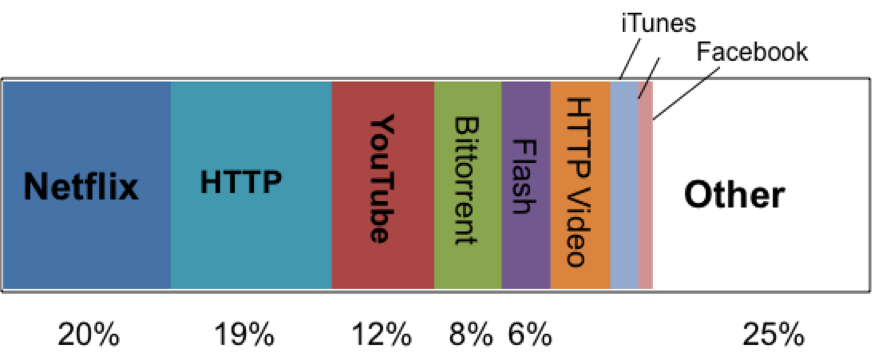Netflix: Bigger than cable. Too big for the Internet?


Back in October, Netflix, and other video content were already taking up more bandwidth than any other single Internet service Gaming, Peer-to-Peer (P2P) file sharing, and Web surfing were all falling behind. It's only gotten worse since then. When I recently looked at how much traffic IPv6 was transporting on the Internet, I found that Netflix, all by itself, was taking up 20%--the largest single share-of all Internet traffic.
There's nothing wrong with that, but is there enough bandwidth on the Internet to support this if this video trend continues? I doubt it.
Internet Service Providers (ISPs) are capping their monthly services, ISPs, like Comcast, are also trying to charge Content Delivery Networks (CDNs), the high-speed Internet traffic backbones used by video services, such as Level 3 extra charges for their traffic.
The cable companies are in the odd place of having their comparatively low-revenue ISP services starting to eat their far more profitable cable TV services. On top of that, to supply the need for more and faster bandwidth, they need to upgrade their backbones to IEEE 802.3ba, the standard for 40 Gigabit Ethernet (GigE) and 100GigE Ethernet.
100GiigE may sound fast--and it is--but it's not fast enough. Some people are already demanding, not mere Terabit networking, but 1.4Terabit networks. In the meantime, ISPs are still struggling to get 802.3ba up and running. And, let's not even talk about how much trouble it is to get decent broadband in the last mile from the ISP to your home or office.
So what does all that mean for you? Well, it means you can expect to pay more for broadband and get less of it thanks to bandwidth caps. Someone is going to need to make up the revenue cable companies are starting to lose to Internet video and that someone will be you and me. On top of that, someone is going to need to pay for the network infrastructure and that means, again, we're going to get stuck with the bill. Adding insult to injury, I expect we're also going to need less reliable service as the existing Internet bends under the ever heavier demands of video watchers and mobile users.
If we're lucky the Internet won't break. But, I can certainly see Internet "brownouts" as a real possibility in 2012.
Lucky us.
Related Stories:
Netflix reports strong Q1 earnings; approaching 25 million subscribers
Netflix anticipates TV Everywhere to be biggest competitor
Netflix may begin offering family plans with multiple simultaneous stream options later this year
The Internet belongs to Netflix
Google TV, Apple TV, & Roku's Biggest Enemy: A lack of Internet Bandwidth